Pros and Cons of Different Types of Concrete for Driveways
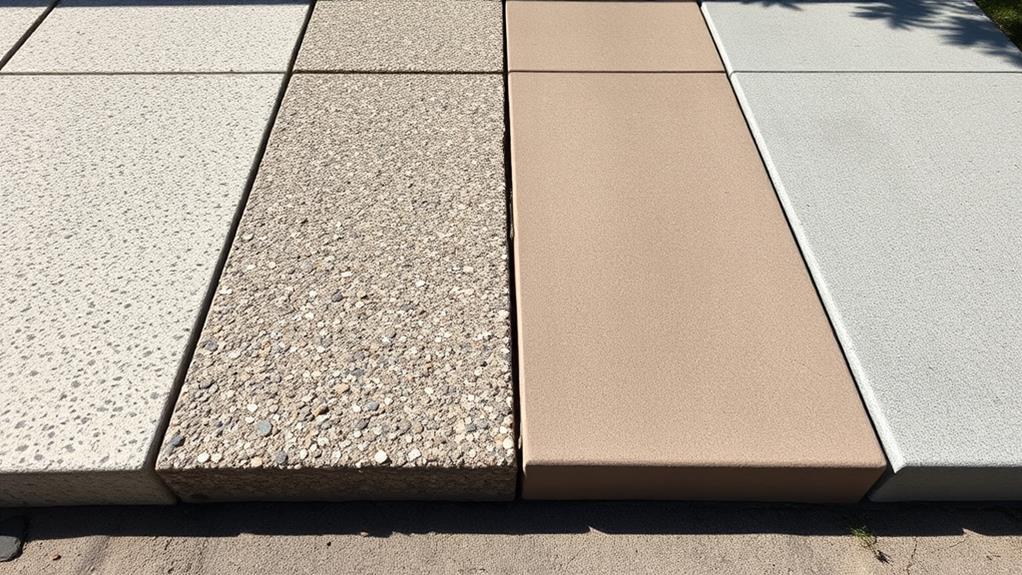
When you're considering a new driveway, you'll quickly discover that concrete isn't just concrete anymore. There's a wide array of options available, each with its own set of advantages and drawbacks. From standard gray slabs to intricately stamped designs, and from colorful hues to exposed aggregate finishes, the choices can be overwhelming. You'll need to weigh factors like cost, durability, maintenance, and aesthetics to make the right decision for your home. But before you start comparing, it's essential to understand what each type of concrete driveway brings to the table. Let's explore the pros and cons that'll shape your choice.
Concrete Contractor Highlights
- Standard concrete offers affordability and durability, but lacks design versatility compared to other options.
- Stamped concrete provides aesthetic appeal with various patterns, but may require more maintenance and be prone to cracking.
- Decorative concrete allows extensive customization and enhanced durability, but comes with a higher initial cost.
- Exposed aggregate concrete offers a slip-resistant, weatherproof surface, but requires specialized application techniques and may be more expensive.
- Colored concrete allows personalization but needs careful maintenance to preserve its appearance and may cost more than traditional gray concrete.
Concrete Contractor Services Residential And Commercial
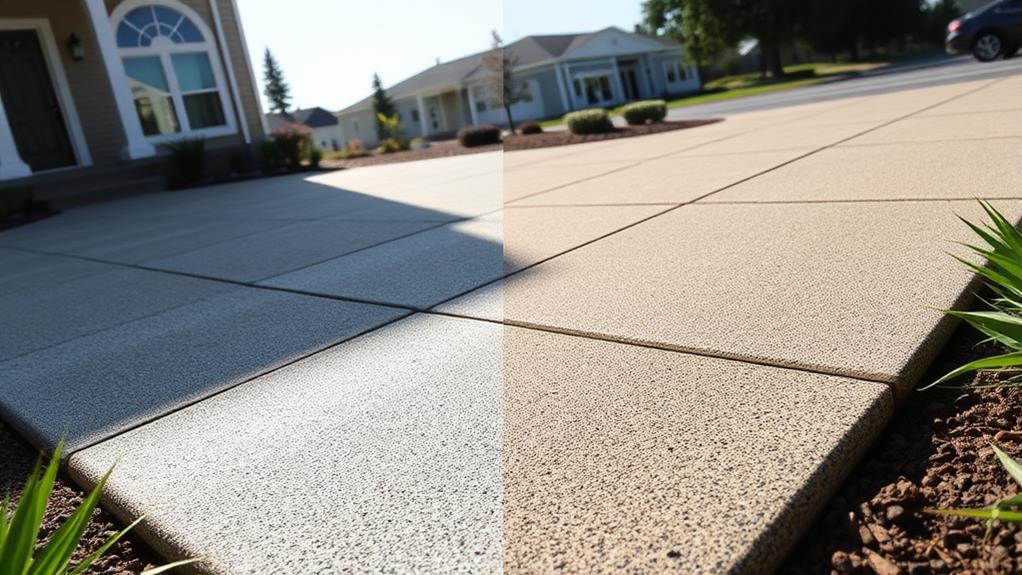
As experienced concrete contractors, we offer extensive services for both residential and commercial driveway projects. Our team specializes in installing various types of concrete driveways, including standard concrete, stamped concrete, and decorative concrete options.
We work closely with homeowners and business owners to determine the best concrete solution for their specific needs, taking into account factors such as budget, aesthetic preferences, and durability requirements. Utilizing state-of-the-art equipment and techniques, we guarantee high-quality results.
Our skilled professionals handle every aspect of the driveway installation process, from site preparation and form-setting to concrete pouring and finishing. With our expertise in both residential and commercial concrete work, we ensure that each driveway project is completed to the highest standards, providing long-lasting, attractive results that enhance property value and curb appeal.
Composition of Concrete Mixtures
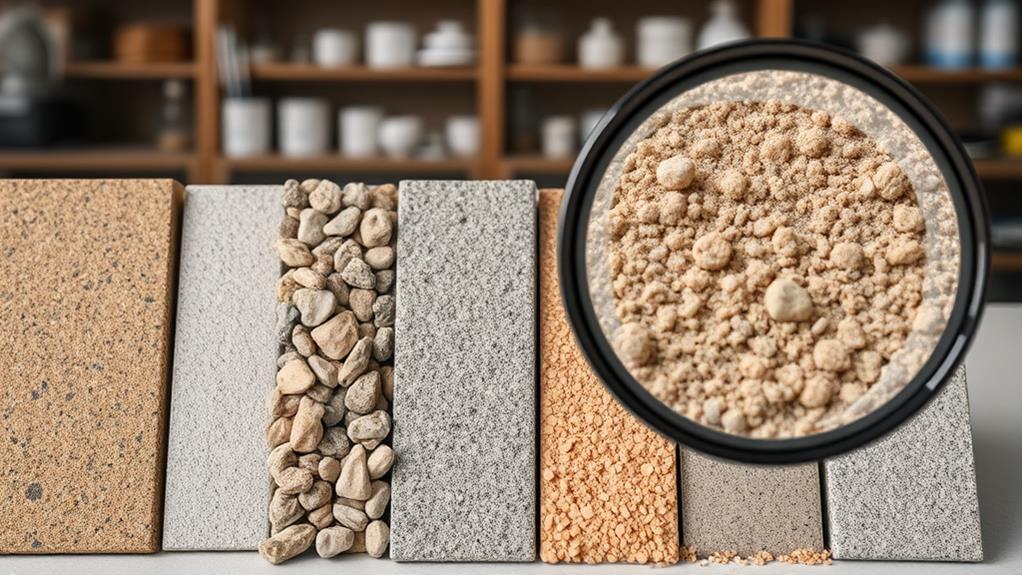
Understanding the composition of concrete mixtures is essential when selecting the right type for your driveway. Concrete Leveling Solutions, Inc. utilizes premium-grade materials to guarantee superior workmanship in their concrete compositions.
You'll find that concrete typically consists of four basic ingredients: cement, water, fine aggregates (sand), and coarse aggregates (gravel or crushed stone). To enhance specific properties, various admixtures and additives can be incorporated, such as air-entraining agents for freeze-thaw resistance or water reducers for improved workability.
The ratio of these components can be adjusted to create different concrete mixtures tailored to specific project requirements, climate conditions, and performance expectations.
Basic Concrete Ingredients
Concrete's basic ingredients form the foundation of every driveway mix. You'll find that these components work together to create a durable and long-lasting surface for your home. The primary constituents of concrete are cement, water, and aggregates, with each playing an essential role in the final product's strength and performance.
Cement, typically Portland cement, acts as the binding agent in concrete. When mixed with water, it undergoes a chemical reaction called hydration, which causes the mixture to harden and gain strength over time. The aggregates, consisting of both fine (sand) and coarse materials (gravel or crushed stone), provide bulk and contribute to the concrete's overall structure and durability. The proportion of these ingredients considerably influences the concrete's properties, including its workability, strength, and resistance to weathering.
Additionally, you may encounter admixtures in some concrete mixes. These are chemicals added in small quantities to modify specific characteristics of the concrete, such as setting time, workability, or air content. By understanding these basic ingredients, you'll be better equipped to choose the right concrete mix for your driveway project, ensuring a result that meets your needs and stands the test of time.
Admixtures and Additives
Numerous admixtures and additives can enhance concrete's performance for driveways. You'll find that these supplementary materials can substantially improve your concrete's durability, workability, and aesthetic appeal.
Water-reducing admixtures, for instance, allow you to maintain the desired consistency while using less water, resulting in a stronger, more crack-resistant surface. Air-entraining agents introduce tiny air bubbles into the mix, enhancing freeze-thaw resistance—an essential feature for driveways in colder climates.
Color pigments offer you the opportunity to customize your driveway's appearance, allowing it to complement your home's exterior. Fiber reinforcement, typically in the form of synthetic or steel fibers, can be added to increase tensile strength and reduce cracking.
Accelerating admixtures speed up the setting and curing process, which is particularly beneficial when you're working in cooler temperatures or need to open your driveway to traffic sooner. Conversely, retarding admixtures slow down the setting time, giving you more time to work with the concrete in hot weather conditions.
Mix Ratio Variations
While admixtures and additives can enhance concrete performance, the foundation of a quality driveway lies in its mix ratio. The composition of your concrete mixture profoundly impacts its strength, durability, and workability.
A standard mix ratio for residential driveways typically consists of 1 part cement, 3 parts sand, and 3 parts aggregate. However, you'll find that adjusting these proportions can yield different results tailored to your specific needs.
For instance, increasing the cement content can produce a stronger, more wear-resistant surface ideal for heavy vehicle traffic. Conversely, a higher ratio of aggregate can improve drainage and reduce shrinkage cracks. You might also consider adjusting the water-to-cement ratio, which affects the concrete's workability and final strength. A lower water content generally results in stronger concrete but can be more challenging to work with. It's essential to strike the right balance, as excess water can lead to reduced strength and increased susceptibility to cracking.
Benefits
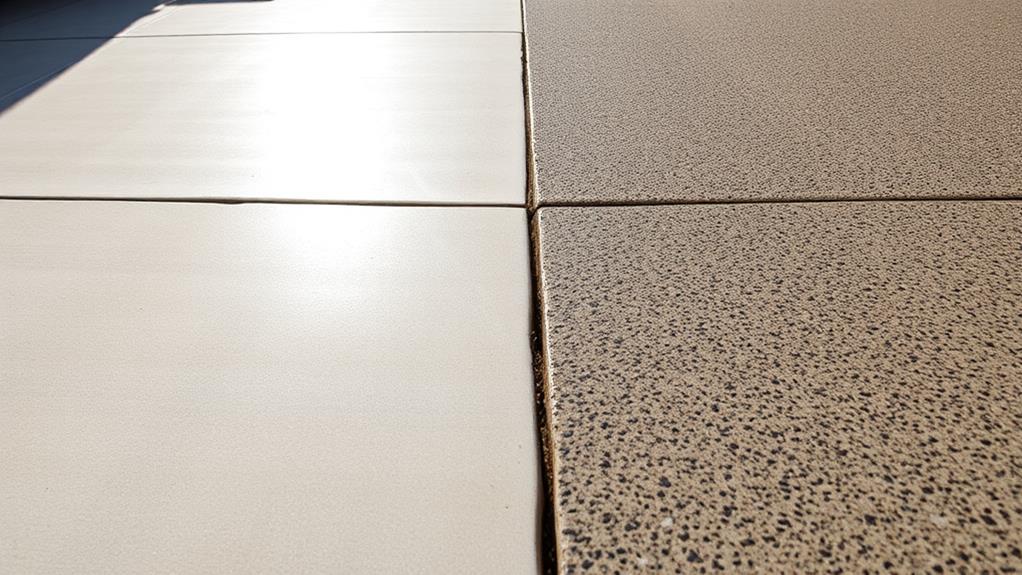
When you're considering concrete for your driveway, you'll find a wealth of benefits that make it an attractive option. Concrete driveways offer exceptional durability and longevity, withstanding heavy traffic and harsh weather conditions for decades, while also providing a canvas for various aesthetic appeal options through stamping, staining, or texturing techniques.
Additionally, concrete is environmentally friendly as it generates a lower environmental impact than asphalt, making it a sustainable choice. You'll also appreciate the low maintenance requirements of concrete driveways, which typically only need occasional cleaning and sealing, all while potentially increasing your property's value due to their longevity and curb appeal.
Durability and Longevity
The two primary benefits of concrete driveways are their exceptional durability and impressive longevity. When you invest in a concrete driveway, you're joining a community of homeowners who value long-term solutions. Concrete's robust composition allows it to withstand heavy vehicular traffic, extreme weather conditions, and the test of time. You'll find that a well-installed concrete driveway can last 25 to 50 years with proper maintenance, drastically outlasting alternatives like asphalt.
The durability of concrete extends beyond its surface strength. It's resistant to oil and chemical spills, which can be particularly beneficial if you're part of a community that values environmental consciousness. Additionally, concrete's ability to distribute weight evenly prevents the formation of ruts and potholes, issues that often plague less durable materials. This resilience translates to reduced maintenance costs over the driveway's lifespan, aligning with the values of those who appreciate cost-effective, sustainable home improvements. By choosing concrete, you're not just paving your driveway; you're laying the foundation for decades of reliable use, joining countless others who've made this wise, long-term investment in their property's functionality and value.
Aesthetic Appeal Options
Gone are the days when concrete driveways were limited to plain, gray slabs. Today, you have a wealth of aesthetic options to choose from, allowing you to create a driveway that perfectly complements your home's style and enhances its curb appeal. You'll find an array of colors, textures, and patterns that can transform your driveway into a stunning architectural feature.
Colored concrete offers a spectrum of possibilities, from subtle earth tones to bold, vibrant hues. You can opt for integral color, where pigments are mixed into the concrete before pouring, ensuring long-lasting results. Stamped concrete allows you to mimic the appearance of more expensive materials like brick, stone, or tile, while exposed aggregate finishes reveal the natural beauty of embedded pebbles or stones. For a more refined look, polished concrete provides a sleek, modern aesthetic that's both sophisticated and low-maintenance. You can even combine these techniques, creating custom designs that reflect your unique taste and elevate your property's overall aesthetic. With these diverse options, you'll be able to achieve a driveway that not only serves its functional purpose but also becomes an integral part of your home's visual identity.
Low Maintenance Requirements
Beyond its aesthetic appeal, concrete offers significant benefits with regards to low maintenance requirements for your driveway. You'll appreciate the ease of upkeep, as concrete driveways typically need minimal attention to guarantee their functionality and appearance. Unlike other materials, concrete doesn't require frequent sealing or resurfacing, saving you time and money in the long run.
Concrete's durability means you won't have to worry about replacing individual sections or dealing with recurring potholes. Its smooth surface is easy to clean, allowing you to simply sweep away debris or use a pressure washer for more thorough cleaning. You'll find that snow and ice removal is also more manageable on concrete, as its even surface facilitates easier shoveling and plowing.
Additionally, concrete's resistance to oil and other automotive fluids means you won't have to contend with unsightly stains that can be difficult to remove from other materials. This resilience ensures your driveway maintains its appearance with minimal effort on your part. By choosing concrete for your driveway, you're investing in a low-maintenance solution that will serve you well for years to come, allowing you to focus on enjoying your home rather than constantly tending to your driveway.
Increased Property Value
With a concrete driveway, you're not just enhancing your home's curb appeal; you're also boosting its overall value. A well-designed and properly installed concrete driveway can dramatically increase your property's worth, making it an attractive investment for homeowners looking to maximize their return. Prospective buyers often view a durable, low-maintenance driveway as a valuable asset, potentially influencing their decision to purchase your home.
Different types of concrete can offer varying levels of value appreciation. For instance, stamped or decorative concrete driveways can add a touch of elegance and uniqueness to your property, setting it apart from others in the neighborhood. Exposed aggregate concrete, with its textured finish, can create a sophisticated look that appeals to discerning buyers.
Meanwhile, plain concrete driveways, while less visually striking, still offer excellent durability and longevity, which are highly valued traits in the real estate market. By choosing a concrete driveway that complements your home's architecture and landscaping, you're not only improving your daily living experience but also making a smart financial decision that can pay dividends when it's time to sell your property.
Concrete Sealant Application Techniques
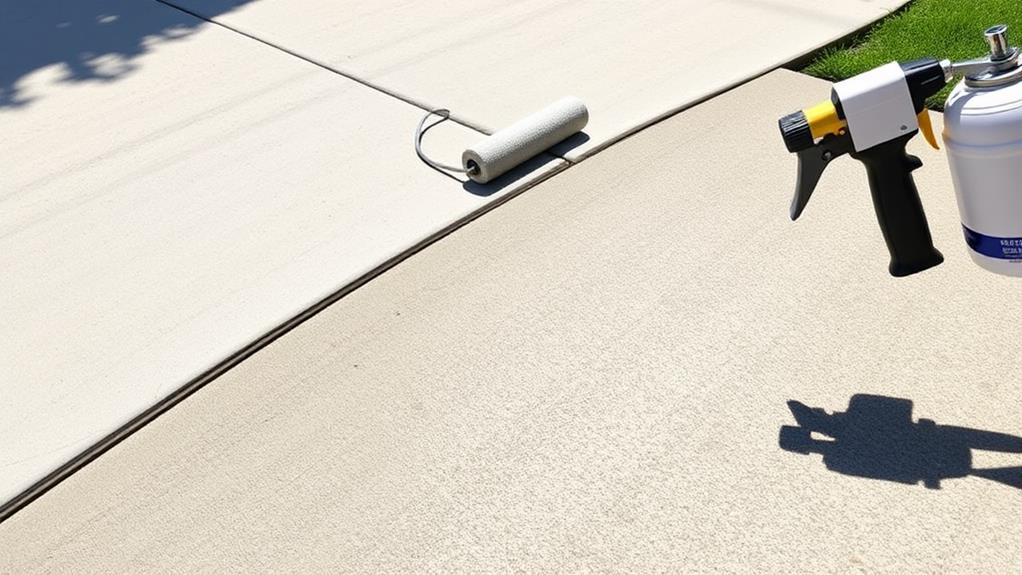
When it comes to applying concrete sealant, you'll need to choose between brush, roller, or spray-on methods, each with its own advantages and challenges. You'll want to contemplate factors like surface area, texture, and the specific type of sealant you're using when selecting your application technique. It's paramount to pay attention to temperature and timing, as these elements can drastically influence the effectiveness and longevity of your sealant application.
| Method | Advantages | Ideal For |
|---|---|---|
| Brush | Precise control, good penetration | Small areas, intricate details |
| Roller | Quick coverage, even application | Large, flat surfaces |
| Spray-On | Fastest method, uniform coating | Textured surfaces, large areas |
Brush vs. Roller Application
Considering the various methods of applying concrete sealant, it's essential to understand the difference between brush and roller application techniques. When you're preparing to seal your driveway, you'll need to choose between these two common methods, each with its own set of advantages and challenges.
Brush application offers precision and control, allowing you to work the sealant into cracks and porous areas effectively. You'll find that brushes are particularly useful for edges, corners, and intricate patterns. However, this method can be time-consuming, especially for larger driveways. It may also leave visible brush strokes if not applied carefully.
Roller application, on the other hand, provides faster coverage and a more uniform finish. You can cover expansive areas quickly, making it ideal for larger driveways. Rollers also tend to distribute the sealant more evenly, reducing the risk of over-application in certain spots. However, you might find it challenging to reach tight spaces or achieve the same level of penetration into cracks and pores as you'd with a brush.
Spray-On Sealant Methods
Spray-on sealant methods offer a high-speed solution for concrete driveway protection. You'll find this technique particularly efficient for large surface areas, as it allows for quick and even coverage. When applying spray-on sealants, you'll need to use a low-pressure sprayer, maintaining a consistent distance from the surface to guarantee uniform application. It's essential to work in small sections, overlapping slightly to avoid missed spots.
Before spraying, you'll want to thoroughly clean and prepare your driveway's surface. This process typically involves power washing and allowing the concrete to dry completely. You'll also need to shield surrounding areas from overspray by using plastic sheeting or masking tape.
When you're ready to begin, you'll find that spray-on sealants come in various formulations, including water-based and solvent-based options. Each type has its own drying time and durability characteristics, so you'll want to choose one that best suits your climate and usage needs. Remember, while spray-on methods are faster, they may require more skill to achieve an even finish compared to brush or roller applications.
Temperature and Timing Considerations
Temperature and timing play paramount roles in the success of your concrete sealant application. You'll need to ponder both ambient temperature and surface temperature when planning your project. The ideal temperature range for applying most concrete sealants is between 50°F and 80°F (10°C to 27°C). If it's too cold, the sealant may not cure properly, while excessive heat can cause it to dry too rapidly, leading to improper adhesion.
Timing is equally critical. You'll want to apply the sealant when the concrete is completely dry and cured, which typically takes about 28 days for newly poured concrete. However, if you're resealing an existing driveway, you'll need to guarantee it's thoroughly cleaned and any repairs are completed before application.
It's also paramount to check the weather forecast, as you'll need at least 24 to 48 hours of dry conditions after application for the sealant to cure properly. By carefully pondering these temperature and timing factors, you'll greatly increase the likelihood of achieving a durable, long-lasting seal for your concrete driveway, guaranteeing it remains protected from the elements for years to come.
Concrete Contractor FAQ
How Long Does a Concrete Driveway Typically Last Before Needing Replacement?
You'll be pleased to know your concrete driveway can last 20-30 years with proper care. It's a durable choice that'll make you feel confident in your home's curb appeal. Regular maintenance will extend its lifespan even further.
Can I Install a Concrete Driveway Myself, or Should I Hire Professionals?
You can install a concrete driveway yourself, but it's a challenging project. For best results, you'll want to hire professionals. They've got the experience and equipment to guarantee your driveway is durable and looks great.
What Maintenance Is Required for a Concrete Driveway Throughout the Year?
You'll need to keep your concrete driveway clean and sealed. Sweep it regularly, remove stains promptly, and apply sealant every few years. In winter, avoid using harsh de-icers. Your driveway will thank you for the care!
How Soon Can I Drive on a Newly Installed Concrete Driveway?
You'll need to be patient with your new driveway, friend. It's best to wait at least 7 days before driving on it. For the first month, avoid heavy vehicles. Your patience will pay off with a long-lasting surface.
Are There Eco-Friendly Options for Concrete Driveways?
You'll be pleased to know there are eco-friendly concrete options for your driveway. You can choose permeable concrete, which allows water to seep through, or opt for mixes containing recycled materials. These choices help you reduce your environmental impact.
